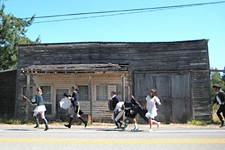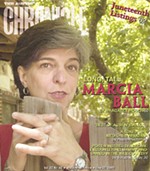New Territory
Shot in Corpus Christi and Austin, a documentarian's first narrative effort is a dark one
By Belinda Acosta, Fri., March 10, 2006

James Marsh's documentaries have been called "visually audacious," his subjects ranging from the seductively horrifying (Wisconsin Death Trip) to sublime meditations on theme (Story of a Song, a 1993 series made for BBC Arena, featured backstories of Elvis Presley's "Heartbreak Hotel," Bob Dylan's "Highway 61 Revisited," and others). His first feature-length narrative, The King, is directed from a screenplay co-written with Milo Addica (Monster's Ball).
In it, Gael García Bernal stars as Elvis Sandow, the illegitimate son of David Sandow (William Hurt), a born-again preacher in Corpus Christi. David prefers to forget the sinful past that begot Elvis, who longs for his father's acknowledgement. The primacy of this desire sets The King onto an astonishing path. Bernal gives a guileless performance in a film some viewers might find disturbing, and others outright offensive. Yet, from The King's early, gentle cadences to its final, revelatory scenes, it expands with a weight found in the world's great tragedies, leaving a lasting impression. Now living in New York, Marsh shared some thoughts about the film by telephone.
Austin Chronicle: Where did the seed for The King come from?
James Marsh: The original idea came from our decision about location. We began thinking about the film in 2000. I had first been to Texas when I made a documentary about Peggy Sue in the Buddy Holly song. Because I see and remember things with a documentary filmmaker's eye, certain images I saw stayed with me: headless animals, women's underwear, bullet casings on the ground.
I was intrigued by the vastness of Texas; its mythology and history was very appealing. There is a very interesting, contradictory visual mix in Corpus Christi that feeds into [The King], I think. The visual clashes I saw there were intriguing: this neat little seaside town, near this wasteland ... of massive, glowing refineries ...
And then there are two biblical stories, the story of the prodigal son in the New Testament and the Cain and Abel story in the Old Testament. Because of Gael, we tied into the big Hispanic mix of Texas; how Texas was part of Mexico once, and how this character played by Gael, in a sense, returns to claim a piece of his rightful territory.
AC: Was Bernal always attached to the film?
JM: He was a very early choice. I saw him in Y Tu Mamá También and Amores Perros and think he's the most exciting actor out there. ... It's a very subversive script, and he connected to it. We found him, and he found us. Really, he was our first and only choice.
AC: And William Hurt?
JM: He came late. Like other small films, we were working with a low budget and checkered production history. We cast someone else earlier, but [Hurt] ... adapted so quickly to [David Sandow]. He understood we weren't satirizing or making fun of his faith. He's a man who really tries to live what he speaks.
AC: As a documentary filmmaker, was it a challenge working with actors?
JM: Oh, there were enormous challenges. Actors know a particular language you have to learn quickly. I gave them enormous leeway and responsibility, because I'm not going to tell William Hurt what to do. [Laughs] It's a collaboration that involves trust on both sides. In the end, it paid off.
AC: Visually, many images appear highly deliberate. For example, the scenes with Elvis and Malerie (Pell James) at creeks and lakes. You were in Corpus Christi. Why not the Gulf for those scenes?
JM: Those scenes were filmed in Austin, as were the majority of the interiors. I thought it was important to have a fairy-tale quality to their courtship. I wanted to seduce with that pictorial style.
AC: When I first viewed the film, I wasn't buying what I thought were convenient circumstances. But as it progressed, I decided the film is an allegory. Does that definition make you blanch?
JM: A little, only because I consider it heightened realism. Once it unfolds, it has its own logic. It ends deliberately provocative. If it offers something, it's for the viewer to complete the film for yourself and let you get angry or intrigued. It's up to you as to how you respond.
AC: So, calling it an allegory doesn't work for you?
JM: If it works for you, it works for me. It's amazing, the spectrum of responses. People get upset, offended. But it's all very good. ![]()
The King
North American PremiereTuesday, March 14, 9:30pm, Paramount












